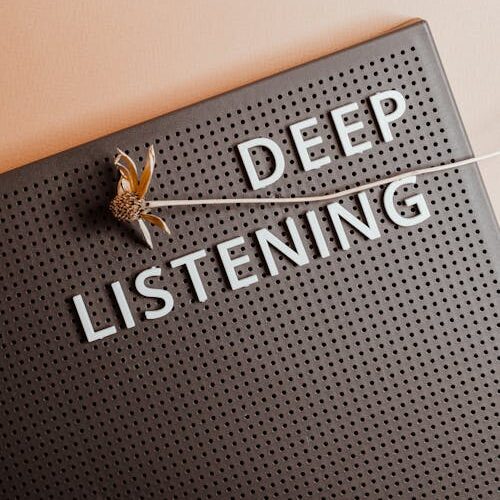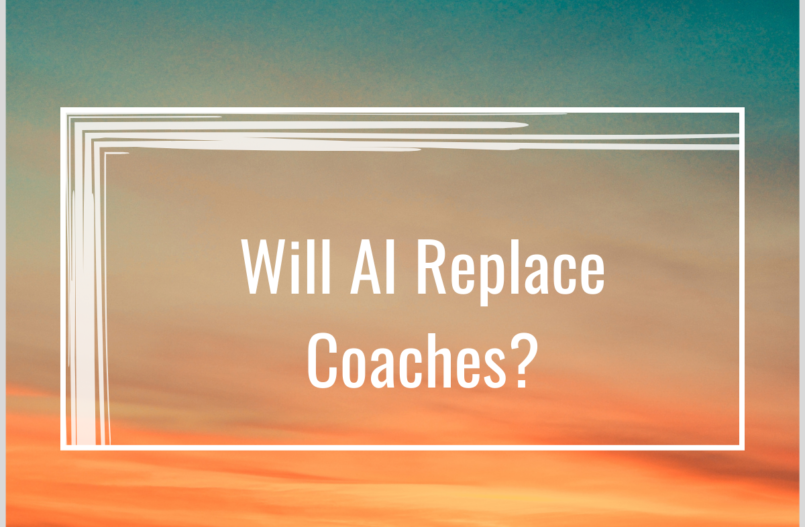One of the coaches that I mentor shared a concern that coaches will soon be replaced with AI.
She asked me what I thought about that.
In return, I asked her whether she had experienced AI coaching or therapy. She said no.
I have.
I used an AI CBT chat bot, and for the first 5-7 minutes, it wasn’t bad at all. However, later, when I got stuck in the conversation, the chat bot started to go in circles, and I became more and more annoyed.
Here’s my takeaway from the experience and observations.
Let’s admit it. AI is impressive, and it’s going to become even more impressive at lightning speed. It can do an amazing job based on algorithms.

Here comes the catch! Good coaching isn’t based on an algorithm. It’s all about connection, understanding, and those delightful “aha” moments that come from deep human interaction.
Imagine this: You’re having a rough day, and you need to talk it out. Would you rather vent to a friend who listens, nods empathetically, and maybe even offers a hug, or to a chat bot that says, “I’m sorry you’re feeling this way. Here’s what you can try to feel better”? Sure, the chat bot might have perfect grammar, but it’s missing that crucial human touch.
Coaching is much the same. It’s about the relationship between coach and client. The magic happens in those moments of genuine connection and understanding. Think about the last time you felt truly heard. How did that change your perspective or motivate you?
Now think about parallel process — something AI just can’t grasp. This is when the dynamics of the coach-client relationship mirror the client’s other relationships. For example, if a client feels unheard at work and starts feeling unheard in sessions, it may highlight a pattern that needs addressing. An AI can’t pick up on these subtle, yet powerful, dynamics.

Interpersonal dynamics play a huge role too. Coaching often involves navigating complex emotions, unspoken tensions, and body language cues. A simple raised eyebrow from your coach could make you rethink your entire approach. AI is great, but it’s not raising any eyebrows—literally or figuratively.
Relating to people is key. Can an AI truly understand the depth of a client’s fear of failure, their joy in a small victory, or the nuance of their dreams and aspirations? Reflect on the most profound interactions you’ve had. What made them impactful? Was it the content, or was it the connection, the feeling of being understood, and the important insights that emerged from a genuine conversation?
If your coaching follows an algorithm, there may be a reason to be concerned. You may find a good direction for growth in what’s called the heart of coaching—the relational, emotional, and dynamic aspects.

Here are some questions to reflect on:
- How do I ensure that my coaching remains client-centered and not just process-driven?
- What unique qualities do I bring to the coaching relationship that no AI could replicate?
- What feedback have I received from clients about the impact of my coaching or our work together?
- How do I get better at creating a space where my clients feel truly heard and understood?
- In what ways do I notice and respond to the subtle dynamics and emotions that arise during coaching? How can I become more skillful at identifying and addressing them?
- How do I incorporate parallel process into my coaching practice? How can I use observations on our relational dynamics to create learning for my clients?
- How do I continue to develop and refine my skills in empathy, intuition, and emotional intelligence?
- In what ways do I encourage clients to explore their deeper fears, dreams, and motivations?
- How do I stay attuned to my clients’ changing needs and goals throughout the coaching relationship?
- How do I create and maintain a deeply human, empathetic coaching presence?
- How can I stay connected to new technology in the coaching field while maintaining the integrity of the human connection?
Luba Diasamidze PhD, PCC

Luba has been training and mentoring coaches extensively since 2020. She is the author and lead instructor for UpThink Coaching’s ICF Accredited Programs.
Luba is a Certified Mentor Coach (CMC), a Coaching Supervisor and she is trained in PCC Markers Assessment by the ICF.
If you want to take your coaching skills to a new level, explore our Advanced Coach Training (PCC Path) at UpThink Coaching
Reach out to Luba to work with her as your mentor coach or a coaching supervisor.

